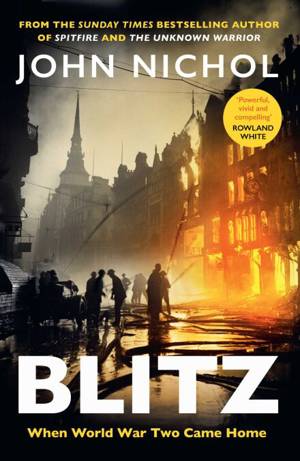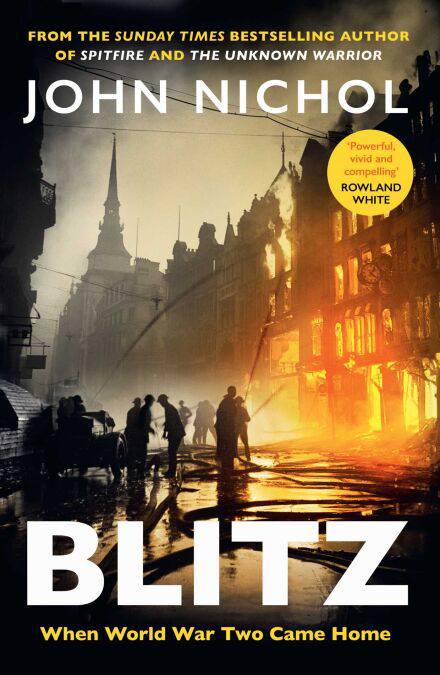
- Afhalen na 1 uur in een winkel met voorraad
- Gratis thuislevering in België vanaf € 30
- Ruim aanbod met 7 miljoen producten
- Afhalen na 1 uur in een winkel met voorraad
- Gratis thuislevering in België vanaf € 30
- Ruim aanbod met 7 miljoen producten
Zoeken
€ 23,34
+ 23 punten
Uitvoering
Omschrijving
‘An exceptional piece of work; powerful, vivid and compelling’ Rowland White, author of Vulcan 607
The Second World War was not only fought in the skies above Europe or on distant beaches. Between 1939 and 1945, Hitler’s aerial onslaught crashed into lives across the UK night after night, killing more than 60,000 civilians and leaving millions homeless.
May 2026 marks the 85th anniversary of the end of the Night Blitz. But the aerial assault on Britain did not stop in May 1941.
For too long, ‘The Blitz’ – from the German ‘Blitzkrieg’ or lightning war – has been framed as a few desperate months from September 1940 that mainly affected London. In reality, the scope of the attack on the home front was far more widespread, and far more devastating. Now, John Nichol tells this supposedly familiar narrative – one of the most important events in British history – afresh.
Beginning with a search to understand his mother’s experiences of the blitz on Tyneside – drawing on fragments of memory and the unanswered questions she left behind – Nichol ranges outward to reveal a truly national history. From Dover to Glasgow, Cardiff to Manchester, he uncovers astonishing accounts of catastrophe and resilience. Of ‘ordinary’ men, women and children catapulted into harm’s way. Of heroic firefighters battling infernos, the unflinching bravery required to defuse unexploded bombs, families wiped out in an instant, communities left bereft by a single blast.
Using interviews with survivors, official records and eyewitness testimonies, Nichol gives voice to the unsung heroes who endured explosions, fire and fear, but found the courage to run towards danger. He brings the story up to date by speaking to people involved in similar situations: mass casualty events, the deadly blaze at Grenfell Tower, bomb disposal in modern warfare and individual acts of astonishing bravery. And as new military threats emerge, Nichol asks whether the country still has such resilience today.
At once gripping and compassionate, BLITZ is the definitive account of a nationwide struggle that shaped the course of the war and the spirit of a generation.
The book includes maps and two plate sections with 38 photos and archival images.
‘The story of a whole nation as only Nichol can write, BLITZ is a wonderful book perfectly anchored in the human experience’ Dr Robert Lyman MBE FRHistS, co-author of Victory to Defeat: The British Army 1918–40
‘A truly powerful and engaging narrative. The way Nichol weaves the story of the Blitz with more recent accounts makes for an excellent read’ Andy Saunders, military historian and author
The Second World War was not only fought in the skies above Europe or on distant beaches. Between 1939 and 1945, Hitler’s aerial onslaught crashed into lives across the UK night after night, killing more than 60,000 civilians and leaving millions homeless.
May 2026 marks the 85th anniversary of the end of the Night Blitz. But the aerial assault on Britain did not stop in May 1941.
For too long, ‘The Blitz’ – from the German ‘Blitzkrieg’ or lightning war – has been framed as a few desperate months from September 1940 that mainly affected London. In reality, the scope of the attack on the home front was far more widespread, and far more devastating. Now, John Nichol tells this supposedly familiar narrative – one of the most important events in British history – afresh.
Beginning with a search to understand his mother’s experiences of the blitz on Tyneside – drawing on fragments of memory and the unanswered questions she left behind – Nichol ranges outward to reveal a truly national history. From Dover to Glasgow, Cardiff to Manchester, he uncovers astonishing accounts of catastrophe and resilience. Of ‘ordinary’ men, women and children catapulted into harm’s way. Of heroic firefighters battling infernos, the unflinching bravery required to defuse unexploded bombs, families wiped out in an instant, communities left bereft by a single blast.
Using interviews with survivors, official records and eyewitness testimonies, Nichol gives voice to the unsung heroes who endured explosions, fire and fear, but found the courage to run towards danger. He brings the story up to date by speaking to people involved in similar situations: mass casualty events, the deadly blaze at Grenfell Tower, bomb disposal in modern warfare and individual acts of astonishing bravery. And as new military threats emerge, Nichol asks whether the country still has such resilience today.
At once gripping and compassionate, BLITZ is the definitive account of a nationwide struggle that shaped the course of the war and the spirit of a generation.
The book includes maps and two plate sections with 38 photos and archival images.
‘The story of a whole nation as only Nichol can write, BLITZ is a wonderful book perfectly anchored in the human experience’ Dr Robert Lyman MBE FRHistS, co-author of Victory to Defeat: The British Army 1918–40
‘A truly powerful and engaging narrative. The way Nichol weaves the story of the Blitz with more recent accounts makes for an excellent read’ Andy Saunders, military historian and author
Specificaties
Betrokkenen
- Auteur(s):
- Uitgeverij:
Inhoud
- Aantal bladzijden:
- 400
- Taal:
- Engels
Eigenschappen
- Productcode (EAN):
- 9781398540378
- Verschijningsdatum:
- 20/05/2026
- Uitvoering:
- E-book
- Beveiligd met:
- Adobe DRM
- Formaat:
- ePub

Alleen bij Standaard Boekhandel
+ 23 punten op je klantenkaart van Standaard Boekhandel
Beoordelingen
We publiceren alleen reviews die voldoen aan de voorwaarden voor reviews. Bekijk onze voorwaarden voor reviews.







